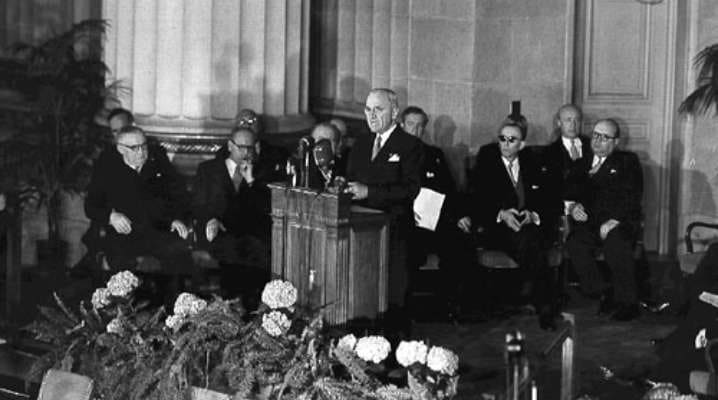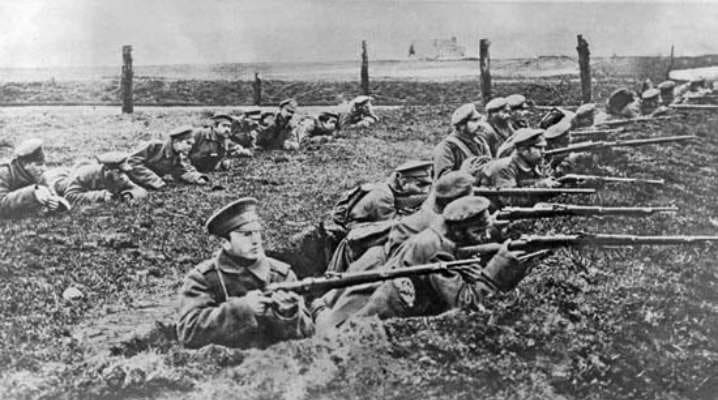In the first half of the 20th century, excessive nationalism, radical ideologies and misguided isolationism plunged Europe into two major wars that set half the world on fire. Today, as these trends are again on the rise, it is instructive to recall how an idealistic pacifist came to the conclusion that a collective defence pact between like-minded countries was the only way to keep the peace.
When 12 foreign ministers from Canada, the United States and ten Western European countries met in Washington on 4 April 1949 to sign a mutual defence treaty, not all observers grasped the significance of the event. The Washington Post quipped that the ceremony may turn out to be “more spectacular than the act itself”. Ironically, the State Department band, paying homage to the First Lady, Bess Truman, played a medley from the musical “Porgy and Bess” that featured “It ain’t necessarily so” and “I got plenty of nothin’”.

US President Harry S. Truman addresses those gathered for the signing of the North Atlantic Treaty by NATO’s twelve founding members in Washington D.C. on 4 April 1949. © NATO
Others, however, understood the ceremony’s historic importance. Count Sforza – the Italian foreign minister who had refused to work for Mussolini – compared the pact to the English Magna Carta: “on one side intangible, on the other side a continuous creation.” In a similar vein, the famous US political commentator, Walter Lippman, argued that “the treaty recognises and proclaims a community of interest which is much older than the conflict with the Soviet Union, and come what may, will survive it.”
Beyond the headlines, the new defence pact had yet another prominent supporter: Sir Norman Angell (1872-1967), economist, journalist, peace activist, bestselling author, and Nobel Peace Prize Laureate of 1933. His support of a defence community of Western democracies to contain the Soviet Union marked the end of a lifelong journey dedicated to the prevention of war by non-military means.
Angell’s political life – during which he transformed from a idealistic pacifist to a believer in collective security schemes and, finally, to a supporter of a transatlantic collective defence alliance – is, in many ways, a mirror of the turbulent first half of the 20th century. Having witnessed two world wars and seen the mayhem inflicted by excessive nationalism and totalitarian ideologies, the world’s best known peace activist realised that an alliance between the Western democracies was the best model on offer.
From idealistic pacifist…
Ralph Norman Angell (Lane), a polyglot Brit who had also lived in France and the United States, achieved fame with his book “The Great Illusion”, published in 1911. In this work, which later earned him the Nobel Peace Prize, he argued that the costs of wars had become so high as to outweigh any prospective gains. Nations, he argued, had become too economically interdependent to make war between them a profitable exercise. Angell’s arguments received enormous attention. As Europe’s major powers appeared to be inching ever closer to war, Angell seemed to demonstrate by way of rational economic argument why that major war would be folly.
“The Great Illusion” was translated into more than 15 languages and sold almost two million copies. W. M. Hughes, the Acting Premier of Australia, called it “a glorious book to read … pregnant with the brightest promise to the future of civilized man.” At major universities, enthusiastic ‘Angellists’ spread the message of the end of war. Lord Esher, President of the Imperial Defence Committee, held the opinion that war “becomes every day more difficult and improbable.” He also was convinced that Germany “is as receptive as Great Britain to the doctrine of Norman Angell.” This was clearly at odds with the political realities in Germany – as Angell’s turbulent speaking tour through that country in 1913 should have revealed – but many British liberals felt that warnings of German militarism were exaggerated.

In the eyes of many observers, the outbreak of the First World War thoroughly discredited the economic arguments of peace activist and bestselling author, Norman Angell, and his followers. © Wikipedia
Angell’s thesis was far from uncontested. Alfred Thayer Mahan, the United States’ leading thinker on maritime strategy, criticised Angell for having ignored non-quantifiable factors. He agreed with Angell about the questionable cost-benefit ratio of major wars but warned that wars did not originate just for economic reasons: “Nations are under no illusion as to the unprofitableness of war in itself; but they recognise that different views of right and wrong in international transactions may provoke collision, against which the only safeguard is armament.” Mahan agreed with Angell that the disruption of the international economic system caused by a major war would also strike back at the aggressor. Yet even this would not mean the end of war, for “... ambition, self-respect, resentment of injustice, sympathy with the oppressed, hatred of oppression” were more than enough reasons why war would not disappear.
“The Great Illusion” had been Angell's attempt to use rational arguments in his struggle against the widespread fatalism about an ‘inevitable’ war with Germany. Yet his powerful prose could not hide the fact that his arguments hardly amounted to more than an interesting compilation of facts and reflections. With respect to Anglo-German relations, Angell made too much of the cultural similarities between the two nations, underestimating their differing strategic interests.
Worse, although Angell never claimed that war had become impossible, only non-profitable, he became a victim of his own journalistic penchant for hyperbole. In October 1913, the American journal “Life” quoted him as saying: “The cessation of military conflict between powers like France and Germany, or Germany and England, or Russia and Germany [...] has come already. [...] Armed Europe is at present engaged in spending most of its time and energy rehearsing a performance which all concerned know is never likely to come off.”
…to realistic pacifist
In the eyes of many observers, the outbreak of the First World War thoroughly discredited Angell and his followers. Economic arguments had not prevented this massive conflagration from occurring. However, the unprecedented devastation caused by that war also affirmed Angell’s thesis that war no longer made economic sense. Consequently, Angell’s attempts to deromanticise war and his plea for enlightened statecraft did not go out of fashion. He continued his struggle for international peace and détente between the major powers, and remained an international celebrity – by the 1930s, “The Great Illusion” had been published in six editions, and Angell had maintained a tremendous literary output. He was knighted and, in 1933, received the Nobel Peace Prize. However, the 1930s provided some hard lessons for Angell and his faith in human rationality. The growth of fascism and communism worried him. He also realised that by appeasing those who were prepared to use military force to achieve their aims, the European democracies were effectively lowering the cost of aggression.
Against this background, Angell’s political thought went through an important evolution. He no longer dwelled on the war-preventing power of economic interdependence. Instead, he devoted more attention to the principle of collective security – a system that included the potential use of force against a violator. In this way, Angell changed from being an idealistic pacifist to a realistic pacifist. He warned against Hitler’s belligerence and he supported Britain’s rearmament. In 1914, he had hastily founded a “Neutrality League” to keep Britain out of the war. At the beginning of the Second World War, by contrast, he supported his country’s cause.

Sir Norman Angell changed from being an idealistic pacifist to a realistic pacifist. He warned against Hitler’s belligerence and supported Britain’s rearmament. © Warfare History Network
Angell was keenly aware that Britain’s victory in the Second World War was largely the result of the United States’ engagement. Consequently, in the immediate post-war era, he lashed out against the anti-Americanism that was growing within Britain’s political left, but also against the rising isolationism in the United States. With the Soviet Union emerging as another totalitarian challenge to the Western democracies, Angell considered the unity of the English-speaking countries a prerequisite for peace in Europe.
For this reason, when the negotiations on a collective defence treaty between North America and Europe commenced, he supported the project. A North Atlantic Security Pact, he argued a few weeks before the signing of the Washington Treaty, could act as a bulwark against Soviet expansionism. Had Germany known the strength of the alliance that would be mobilised against it, he argued, the two world wars probably would not have occurred. Similarly, if the Soviet Union knew about the effective resistance it would face, a third world war would probably be avoided. This unabashed argument for peace through military deterrence was a far cry from his former pacifist beliefs.
Angell’s preference for an inclusive system of collective security, which he had championed after the First World War, remained unchanged. Yet, just as Germany could not be included in such a system in the 1930s, he saw little hope in incorporating the Soviet Union into such an arrangement in the late 1940s. Such a system, he believed, could only work between like-minded powers. By bringing together the major democracies, the emerging transatlantic defence community came closer to his ideal of a system of war prevention. He still held on to his view about the devastating consequences of modern wars but his once optimistic belief in the intellectual progress of mankind had been replaced by a profound scepticism.
Norman Angell may forever be remembered for something he never actually said: that war had become impossible. Yet, just as scholars are now considering him an early pioneer of international relations theory, Angell should also be remembered as a man who managed to acknowledge that preserving peace in a changing world means leaving outdated dogmas behind.
